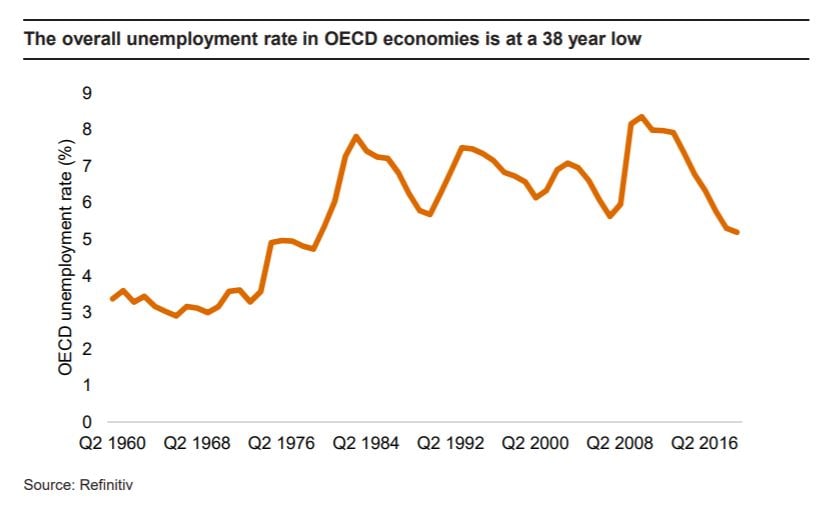{{item.title}}
{{item.text}}

{{item.text}}
London, 07 January: Global economic growth in 2020 is expected to grow at a rate of around 3.4% in purchasing power parity terms compared to its long-term average of a 21st century average of 3.8% per year, according to new projections by PwC.
PwC predict that 2020 will be a year of ‘slowbalisation’ in the global economy, where trade tensions continue to create challenges for global supply chains and further integration of the global economy.
Nevertheless, PwC expect that services will remain a bright spot for global trade, with the total global value of service export forecast to hit a record $7 trillion in 2020. The US and UK are likely to remain the leading exporters of services, although China is expected to overtake France in fourth place during the year.
Uncertain outlook for global trade
The overall picture for 2020 is that global economic growth will continue at a modest pace, as the major economies will be buoyed by accommodative financial conditions and an increased reliance on household consumption as a source of growth instead of net exports and investment.
Barret Kupelian, senior economist at PwC UK, says,
‘Globalisation has been a defining feature of the global economy since the 1970s. Yet the global volume of merchandise traded slowed down dramatically and even went into reverse in 2019. Coupled with the effective disbandment of the World Trade Organization’s (WTO) dispute settlement mechanism in December, we can expect more challenging times ahead for global trade.
‘Yet we should be clear this is a period of “slowbalisation”—with integration and trade flows still growing but at a slower rate. Given the links between merchandise trade flows and economic growth, we can expect to see a similar effect of below-average growth in the global economy in 2020.’
More jobs across the board but not necessarily spread equitably
PwC expect the G7 to continue to create jobs, to the tune of around 2 million. Four out of the five new jobs in the G7 will be created in the US, UK and Japan. As the pool of labour resources in the G7 gradually dries up, earnings will continue their upward trajectory. But in the absence of productivity improvements, corporate profit margins could be squeezed.
Similarly, the International Labour Organization (“ILO”) expects the seven largest emerging economies– the E7–to create about 8 million jobs in net terms. The ILO’s employment projections for the G7 show that jobs will be taken up by men and women in equal measure. Within the E7, however, the ILO expects job creations to be less evenly distributed across genders.
India expected to rise in global economic rankings
According to the IMF’s latest estimates, 2019 was the year when India overtook the UK and France to become the fifth largest economy in the world. This is an ongoing process with India likely on current trends to overtake Germany before 2025 and Japan before 2030 to become the world’s largest economy behind China and the US. France and the UK will now vie for sixth place in the rankings, with their relative position dependent on the value of the pound against the euro which may remain volatile in 2020
US oil production equivalent to half of OPEC
Global renewable energy and nuclear consumption will make up more than 20% of global energy consumption, which is the highest it has ever been. The rise of renewable energy reflects how businesses, households and governments are adapting and changing their attitudes.
China is expected to be the largest consumer of this type of energy closely followed by Europe. However, oil is expected to continue to remain the most preferred source of energy in 2020 for the world economy followed by coal and natural gas. The US and China will remain the largest consumer of oil in the world in 2020.
Global population biggest it has ever been but also the greyest
In 2020, the world’s population is expected to reach 7.7 billion, which is around a 10% increase compared to a decade ago. China, India and Sub-Saharan Africa are expected to drive around half of the world’s annual population increase. At the same time, the number of people above the age of 60 globally is expected to surpass the one billion mark. China is expected to have a larger number of people above the age of 65 than all the six other largest emerging economies put together.
About PwC
At PwC, our purpose is to build trust in society and solve important problems. We’re a network of firms in 152 countries with over 327,000 people who are committed to delivering quality in assurance, advisory and tax services. Find out more and tell us what matters to you by visiting us at www.pwc.com.
PwC refers to the PwC network and/or one or more of its member firms, each of which is a separate legal entity. Please see www.pwc.com/structure for further details.
© 2019 PwC. All rights reserved
David Bowden
Global Communications Manager, United Kingdom, PwC United Kingdom
{{item.text}}

{{item.text}}
